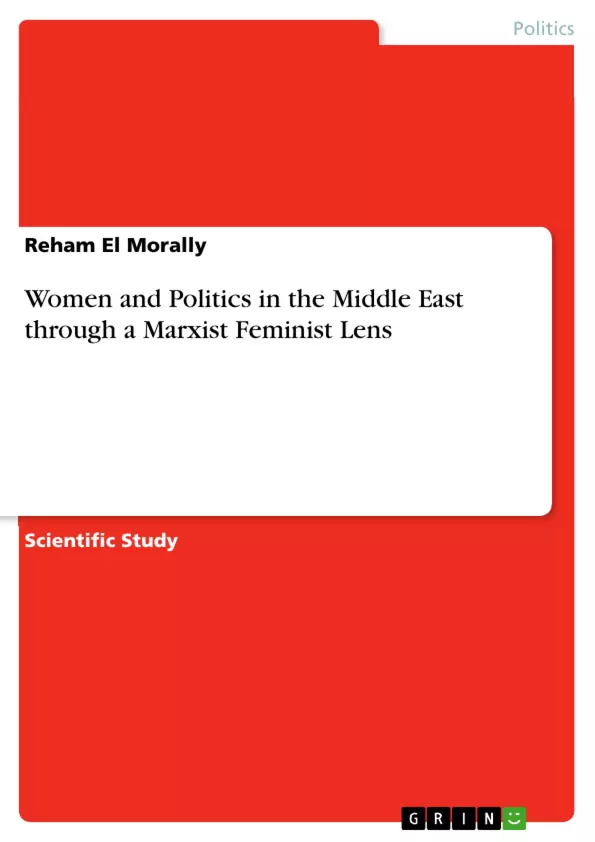The hierarchical social relations inherent to any patriarchal system have resulted in women’s social identities becoming dependent on their relationship with men, as a fathers or husbands. Such relationships have encouraged the view that the oppression of women is the cornerstone of such systems and that their liberation is an essential condition for overcoming it. My question for this paper is: What is the relationship between patriarchy and women’s marginalization and absence in the political sphere? In this paper I will discuss how women are marginalized and silenced by force rather than by choice. To further elaborate on that it must be clear that women, especially in the Middle East, are constrained by different types of patriarchy. They are restrained from growing and aspiring to change power relations by the legal system, by the social conventions and the unequal power relations between male and female, and lastly by externalities that constructed the polity of the region. In order to further carry out this research paper, I will use a Marxist feminist theoretical framework to analyze the issue of women’s marginalization in the Middle East.
Inhaltsverzeichnis (Table of Contents)
- I. INTRODUCTION
- II. WOMEN IN POLITICS: POLITICAL OPPORTUNITIES
- III. WOMEN'S SUBORDINATION AS A REFLECTION OF GLOBAL POLITICS
- IV. PERPETUATION OF PATRIARCHY IN THE FAMILY DYNAMICS
- V. CONCLUSION
Zielsetzung und Themenschwerpunkte (Objectives and Key Themes)
This paper aims to analyze the relationship between patriarchy and women's marginalization in the Middle East, focusing on the political sphere. It explores how women are silenced and excluded from power structures, not by choice, but through the constraints imposed by societal and legal frameworks.
- The impact of patriarchy on women's political participation in the Middle East
- The interplay of legal systems, social conventions, and power imbalances in perpetuating women's marginalization
- The role of Marxist feminist theory in understanding and challenging women's oppression
- The importance of recognizing women's experiences within the context of broader societal forces
- The need for systemic change to address the root causes of women's inequality
Zusammenfassung der Kapitel (Chapter Summaries)
- I. INTRODUCTION: This chapter introduces the research question and highlights the need for a shift towards a more equitable system for women in the Middle East. It emphasizes the limitations of the current political and social frameworks and the need for a paradigm shift that acknowledges and addresses women's perspectives.
- II. WOMEN IN POLITICS: POLITICAL OPPORTUNITIES: This chapter examines the existing opportunities and challenges for women's participation in politics within the Middle East. It analyzes the structural barriers and societal pressures that hinder their advancement and explores the historical context of their marginalization.
- III. WOMEN'S SUBORDINATION AS A REFLECTION OF GLOBAL POLITICS: This chapter delves into the broader global context that shapes women's experiences in the Middle East. It investigates how international political dynamics and historical events have contributed to the perpetuation of patriarchal structures and how these factors influence women's access to power and agency.
- IV. PERPETUATION OF PATRIARCHY IN THE FAMILY DYNAMICS: This chapter explores the role of family dynamics in shaping and reinforcing patriarchal ideologies. It examines how gender roles, power relationships, and societal expectations within the family unit contribute to the oppression of women and their limited participation in the public sphere.
Schlüsselwörter (Keywords)
This research paper focuses on the intersection of gender, power, and politics in the Middle East, exploring the concept of patriarchy as a key driver of women's marginalization and absence from the political sphere. It utilizes a Marxist feminist framework to critically analyze the complex interplay of social, economic, and legal factors that contribute to women's oppression and advocate for systemic change to achieve gender equality.
- Quote paper
- PhD in International Development Reham El Morally (Author), 2019, Women and Politics in the Middle East through a Marxist Feminist Lens, Munich, GRIN Verlag, https://www.grin.com/document/492844



